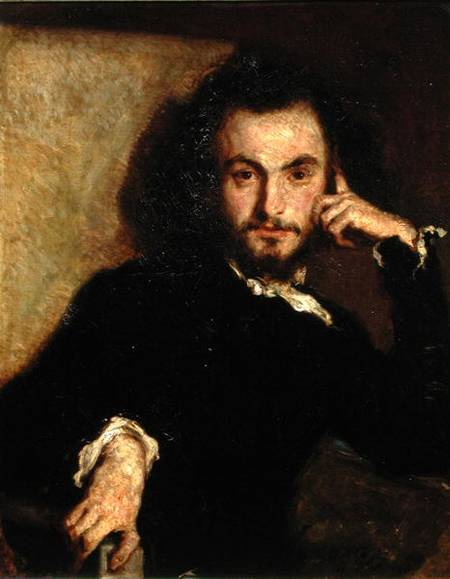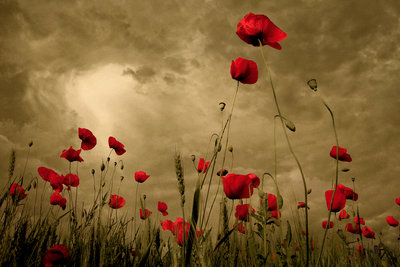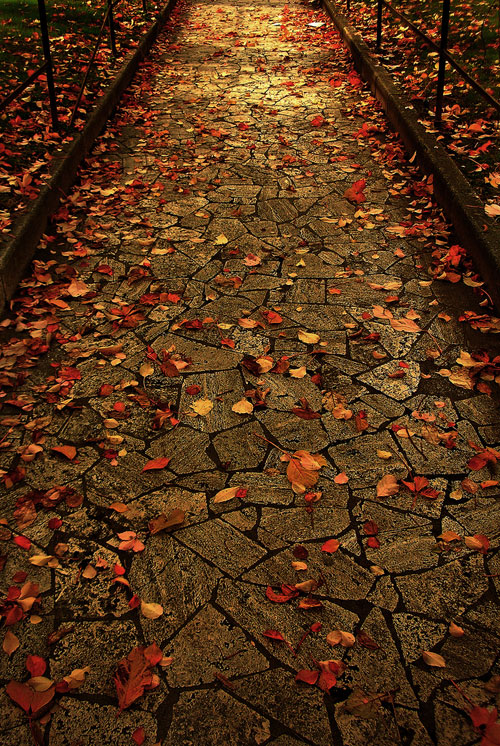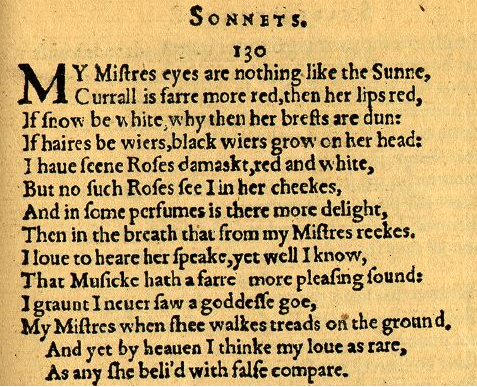Invictus
by William Ernest Henley
Out of the night that covers me,
Black as the Pit from pole to pole,
I thank whatever gods may be
For my unconquerable soul.
In the fell clutch of circumstance
I have not winced nor cried aloud.
Under the bludgeonings of chance
My head is bloody, but unbowed.
Beyond this place of wrath and tears
Looms but the Horror of the shade,
And yet the menace of the years
Finds, and shall find, me unafraid.
It matters not how strait the gate,
How charged with punishments the scroll.
I am the master of my fate:
I am the captain of my soul.
"A fool thinks himself to be wise, but a wise man knows himself to be a fool."- William Shakespeare
by: Charles Dickens (1812-1870)
That creepeth o'er ruins old!
Of right choice food are his meals, I ween,
In his cell so lone and cold.
The wall must be crumbled, the stone decayed,
To pleasure his dainty whim:
And the mouldering dust that years have made
Is a merry meal for him.
Creeping where no life is seen,
A rare old plant is the Ivy green.
Fast he stealeth on, though he wears no wings,
And a staunch old heart has he.
How closely he twineth, how tight he clings
To his friend the huge Oak Tree!
And slyly he traileth along the ground,
And his leaves he gently waves,
As he joyously hugs and crawleth round
The rich mould of dead men's graves.
Creeping where grim death hath been,
A rare old plant is the Ivy green.
Whole ages have fled and their works decayed,
And nations have scattered been;
But the stout old Ivy shall never fade,
From its hale and hearty green.
The brave old plant, in its lonely days,
Shall fatten upon the past:
For the stateliest building man can raise
Is the Ivy's food at last.
Creeping on where time has been,
A rare old plant is the Ivy green.
"A fool thinks himself to be wise, but a wise man knows himself to be a fool."- William Shakespeare
Every flower exhales perfume like a censer;
Labels: Charles Baudelaire, French, Harmonie du Soir, life, life love, poetry, poets
Labels: fall, leaves, life, love, Outlandish Thoughts, poetry, poets, Reluctance, Robert Frost
I typed Robert Browning and google gave me Robert Pattinson...WTF?
1 comments Posted by Melissa at 1:52 PMAll's over, then: does truth sound bitter
As one at first believes?
Hark, 'tis the sparrows' good-night twitter
About your cottage eaves!
And the leaf-buds on the vine are woolly,
I noticed that, to-day;
One day more bursts them open fully
--You know the red turns gray.
To-morrow we meet the same then, dearest?
May I take your hand in mine?
Mere friends are we,--well, friends the merest
Keep much that I resign:
For each glance of the eye so bright and black.
Though I keep with heart's endeavour,--
Your voice, when you wish the snowdrops back,
Though it stay in my soul for ever!--
Yet I will but say what mere friends say,
Or only a thought stronger;
I will hold your hand but as long as all may,
Or so very little longer!
Labels: life love, love, Outlandish Thoughts, poetry, poets, Robert Browning, The Lost Mistress
While this poet is not dead, as all the poets here are, she is talented. From the first line I was captured. Read and I think you'll see what I'm talking about.
A twitter friend, a fellow writer and a coffee obsessive buddy. And they said nothing good would come of Twitter.
%202007/Vacancy-(neon-sign)-2007.jpg)
A Sense of Absence
by Blue Summer
The moment’s full
of nearly dead deceptions,
and they are slick like glass, sharp
as shame in the morning, busy
lapping up their own intentions,
struggling to sustain
what cannot be salvaged.
Every word spoken
leaves a hole, a vacancy,
a thick absence.
And you stood—
And I stood—
but we were both
in different places, tangled
in that tight wire
neither of us could see—
but it’s the feeling that counts,
isn’t it?
In the end, it doesn’t matter,
not as I once thought. These openings
dissolve too quickly, and feelings
are inflamed, shut out, and shut off,
half their old size, bent
into nothing and beyond it.
Something’s slid shut, convincingly
uprooting things that were never there,
and I’m left
in the cold blue moonlight, eyes full
of deep faults and blooming ice,
stuck in a rift
of apprehensive disappointment,
heartsick with these dwindling promises
and raging indifference.
At last,
I am made of terror, but the red, wincing fear,
clawed and bloody, is as untouchable
as a myth, but as abrupt
as a broken sentence. We have been
stripped out
of ourselves and each other,
and there’s no untangling
the bright monster who killed us both.
"A fool thinks himself to be wise, but a wise man knows himself to be a fool."- William Shakespeare
 The Haunted Place
The Haunted Place
by Edgar Allan Poe
In the greenest of our valleys
By good angels tenanted,
Once a fair and stately palace-
Radiant palace- reared its head.
In the monarch
Thought's dominion-
It stood there!
Never seraph spread a pinion
Over fabric half so fair!
Banners yellow, glorious, golden,
On its roof did float and flow,
(This- all this- was in the olden
Time long ago,)
And every gentle air that dallied,
In that sweet day,
Along the ramparts plumed and pallid,
A winged odor went away.
Wanderers in that happy valley,
Through two luminous windows, saw
Spirits moving musically,
To a lute's well-tuned law,
Round about a throne where, sitting
(Porphyrogene!)
In state his glory well-befitting,
The ruler of the realm was seen.
And all with pearl and ruby glowing
Was the fair palace door,
Through which came flowing, flowing, flowing,
And sparkling evermore,
A troop of Echoes, whose sweet duty
Was but to sing,
In voices of surpassing beauty,
The wit and wisdom of their king.
But evil things, in robes of sorrow,
Assailed the monarch's high estate.
\(Ah, let us mourn!- for never morrow
Shall dawn upon him desolate!)
And round about his home the glory
That blushed and bloomed,
Is but a dim-remembered story
Of the old time entombed.
And travellers, now, within that valley,
Through the red-litten windows see
Vast forms, that move fantastically
To a discordant melody,
While, like a ghastly rapid river,
Through the pale door
A hideous throng rush out forever
And laugh- but smile no more.
"A fool thinks himself to be wise, but a wise man knows himself to be a fool."- William Shakespeare
Labels: Death, Edgar Allan Poe, life, Outlandish Thoughts, poetry, poets, The Haunted Place
Arbolé, Arbolé . . .
Federico García Lorca
Arbolé, arbolé,
seco y verdí.
La niña del bello rostro
está cogiendo aceituna.
El viento, galán de torres,
la prende por la cintura.
Pasaron cuatro jinetes
sobre jacas andaluzas,
con trajes de azul y verde,
con largas capas oscuras.
"Vente a Córdoba, muchacha."
La niña no los escucha.
Pasaron tres torerillos
delgaditos de cintura,
con trajes color naranja
y espadas de plata antigua.
"Vente a Córdoba, muchacha."
La niña no los escucha.
Cuando la tarde se puso
morada, con lux difusa,
pasó un joven que llevaba
rosas y mirtos de luna.
"Vente a Granada, muchacha."
Y la niña no lo escucha.
La niña del bello rostro
sigue cogiendo aceituna,
con el brazo gris del viento
ceñido por la cintura.
Arbolé, arbolé.
Seco y verdé.
Tree, tree
dry and green.
The girl with the pretty face
is out picking olives.
The wind, playboy of towers,
grabs her around the waist.
Four riders passed by
on Andalusian ponies,
with blue and green jackets
and big, dark capes.
"Come to Cordoba, muchacha."
The girl won't listen to them.
Three young bullfighters passed,
slender in the waist,
with jackets the color of oranges
and swords of ancient silver.
"Come to Sevilla, muchacha."
The girl won't listen to them.
When the afternoon had turned
dark brown, with scattered light,
a young man passed by, wearing
roses and myrtle of the moon.
"Come to Granada, inuchacha."
And the girl won't listen to him.
The girl with the pretty face
keeps on picking olives
with the grey arm of the wind
wrapped around her waist.
Tree, tree
dry and green.
"A fool thinks himself to be wise, but a wise man knows himself to be a fool."- William Shakespeare
Labels: Arbole Arbole..., boys, bullfighters, Federico Garcia Lorca, girl, life, not listening, picking olives, poetry, poets, Spain, Spainsh, tree, wind
THE MOON
by Percy Bysshe Shelley (1792-1822)
I.
And, like a dying lady lean and pale,
Who totters forth, wrapp'd in a gauzy veil,
Out of her chamber, led by the insane
And feeble wanderings of her fading brain,
The moon arose up in the murky east
A white and shapeless mass.
II.
Art thou pale for weariness
Of climbing heaven and gazing on the earth,
Wandering companionless
Among the stars that have a different birth,
And ever changing, like a joyless eye
That finds no object worth its constancy?
"A fool thinks himself to be wise, but a wise man knows himself to be a fool."- William Shakespeare
Labels: alone, life, Outlandish Thoughts, Percy Bysshe Shelley, poetry, poets, sky, The Moon
Labels: As The Sparrow, Charles Bukowski, life, love, Outlandish Thoughts, poetry, poets
Charles Baudelaire (1821-1867) was a french poet--some argue one of the greatest french poets of the 19Th century-- who was given the surnom of 'the father of modern criticism,' shocked the Conservatives with his unveiled view of lust and decay. Baudelaire was the first to assimilate modern, artificial, and decadent--was on the side of artificiality, saying that vices are natural and essentially selfish where virtue are artificial because one put forth an conscious effort and restraint in order to be good. To Baudelaire the snobbishly controlled and the dandy were heroes and the ultimate proof of meaningless existence. He was a gentleman who never became vulgar and remained a cool collected smile.
His life was not an easy one, death, sadness and an estranged relationship with his mother after her third marriage, he was sent to boarding school and was expelled. His true passion since childhood was to live by his pen but still he enrolled in Law school, around this time he became addicted to Opium and later contracted lethal syphilis. His debts piled higher and higher around him and he left his studies and never returned.
From 1852 to 1865 he was occupied in translating Edgar Allan Poe's writings. In Poe, Baudelaire found a kindred spirit (Now you probably know why I like him. Anyone who loves Poe is aces in my book). When his Les Fleurs du Mal(The Flowers of Bad) came out all the people who had a hand in the work- author, printer, and publisher -were prosecuted and found guilty of obscenity and blasphemy. In this controversial book he transfers his guilt, sins and lies on the reader making them feel just as the poet felt. Waving the truth before their eyes and shedding the blinders with words, what powerful words, "If poison, arson, sex, narcotics, knives / have not yet ruined us and stitched their quick, / loud patterns on the canvas of our lives, / it is because our souls are still too sick."
With out further ado...the poem!
Charles Baudelaire's words translated by Roy Campbell
My blood in waves seems sometimes to be spouting
Across the town, as in the lists of battle,
I've also sought forgetfulness in lust,
Labels: blood, Charles Baudelaire, Death, Fleurs du mal, French, La Fontaine de Sang, life love, nature, Outlandish Thoughts, pain, poetry, poets
My one, the sister without peer,
The handsomest of all!
She looks like the rising morning star
At the start of a happy year.
Shining bright, fair of skin,
Lovely the look of her eyes,
Sweet the speech of her lips,
She has not a word too much.
Upright neck, shining breast,
Hair true lapis lazuli;
Arms surpassing gold,
Fingers like lotus buds.
Heavy thighs, narrow waist,
Her legs parade her beauty;
With graceful step she treads the ground,
Captures my heart by her movements.
She causes all men's necks
To turn about to see her;
Joy has he whom she embraces,
He is like the first of men!
When she steps outside she seems
Like that the Sun!
Labels: Egypt, life, love, Outlandish Thoughts, poetry, poets, Sister without Peer
I'm sorry to say so but, sadly, it's true and Hang-ups can happen to you.
You can get all hung upin a prickle-ly perch.And your gang will fly on.You'll be left in a Lurch.
You'll come down from the Lurch with an unpleasant bump.
And when you're in a Slump,you're not in for much fun.Un-slumping yourself is not easily done.
You will come to a place where the streets are not marked.
And IF you go in, should you turn left or right...or right-and-three-quarters?
You can get so confused that you'll start in to race
...for people just waiting.
Waiting for the fish to bite or waiting for wind to fly a kite or waiting around for
NO!That's not for you!
Somehow you'll escape all that waiting and staying.
"A fool thinks himself to be wise, but a wise man knows himself to be a fool."- William Shakespeare
My hands are shaking from carrying this torch...from carrying this torch for you!
6 comments Posted by Melissa at 3:41 AMLucifer in Starlight
George Meredith (1828–1909)
ON a starr’d night Prince Lucifer uprose.
Tir’d of his dark dominion swung the fiend
Above the rolling ball in cloud part screen’d,
Where sinners hugg’d their spectre of repose.
Poor prey to his hot fit of pride were those.
And now upon his Western wing he lean’d,
Now his huge bulk o’er Africa careen’d,
Now the black planet shadow’d Arctic snows.
Soaring through wider zones that prick’d his scars
With memory of the old revolt from Awe,
He reach’d a middle height, and at the stars,
Which are the brain of heaven, he look’d, and sank.
Around the ancient track march’d, rank on rank,
The army of unalterable law.
"A fool thinks himself to be wise, but a wise man knows himself to be a fool."- William Shakespeare
Labels: Devil, evil, George Meredith, God, heaven, hell, Lucifer in the Starlight, Outlandish Thoughts, poetry, poets, sin
My mistress' eyes are nothing like the sun;
Coral is far more red than her lips' red;
If snow be white, why then her breasts are dun;
If hairs be wires, black wires grow on her head.
I have seen roses damask'd, red and white,
But no such roses see I in her cheeks;
And in some perfumes is there more delight
Than in the breath that from my mistress reeks.
I love to hear her speak, yet well I know
That music hath a far more pleasing sound;
I grant I never saw a goddess go;
My mistress, when she walks, treads on the ground:
And yet, by heaven, I think my love as rare
As any she belied with false compare.
Labels: life, love, Outlandish Thoughts, poetry, poets, Sonnet 130, William Shakespeare
I think I may be in love with Shakespeare...alot of good that will do me!
5 comments Posted by Melissa at 9:19 AMVenus and Adonis
I'll be a park, and thou shalt be my dear;
Feed where thou wilt, on the mountians or in dale;
Graze on my lips, and if those hills be dry,
Stray lower, where the pleasant fountains lie.
Yes, that Shakespeare class turned me from a girl who kind of got what he was saying to the girl who reads his words and thinks 'If only he were alive today, I'd so make that man mine!'
Happy sunday my friends!
"A fool thinks himself to be wise, but a wise man knows himself to be a fool."- William Shakespeare
Labels: love, poetry, poets, Venus and Adonis, William Shakespeare
Robert Frost...not just the guy who wrote the poem at the beginning of Eclipse(Fire and Ice)
2 comments Posted by Melissa at 12:05 AMLabels: choices, life, Outlandish Thoughts, poetry, poets, roads, Robert Frost, The Road Not Taken
Labels: Hamlet, poetry, poets, To A Stranger, To be or not to be, William Shakespeare













